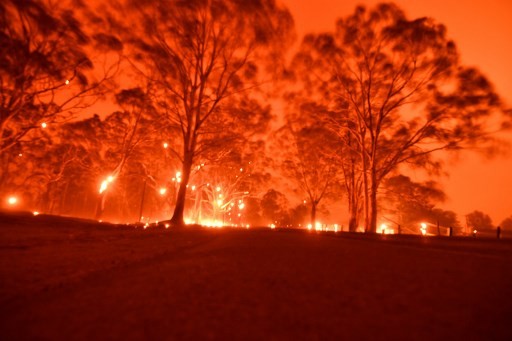Popular Reads
Top Results
Can't find what you're looking for?
View all search resultsPopular Reads
Top Results
Can't find what you're looking for?
View all search resultsFires, floods that unite
The bushfires and forest fires should present Australia and Indonesia with an opportune moment to consider climate issues at the top of their cooperation agenda.
Change text size
Gift Premium Articles
to Anyone
 The afternoon sky glows orange from bushfires in the area around the town of Nowra in the Australian state of New South Wales on December 31, 2019. Thousands of holidaymakers and locals were forced to flee to beaches in fire-ravaged southeast Australia on December 31, as blazes ripped through popular tourist areas leaving no escape by land. (AFP/Saeed Khan)
The afternoon sky glows orange from bushfires in the area around the town of Nowra in the Australian state of New South Wales on December 31, 2019. Thousands of holidaymakers and locals were forced to flee to beaches in fire-ravaged southeast Australia on December 31, as blazes ripped through popular tourist areas leaving no escape by land. (AFP/Saeed Khan)
T
he horrific scenes of bushfires Down Under, experts warn, may well continue to recur; as will floods of the sort that struck Greater Jakarta, Banten and West Java over the New Year. Thousands have been displaced by both disasters, although comparatively more victims in Indonesia can return home.
Though we fervently hope we are not looking at the “new normal” of weather trends in our region, the simultaneous Australian bushfires and the massive floods at home highlight a hitherto little-regarded aspect of Australia-Indonesia bilateral relations: the climate.
Researchers have not reached a 100 percent consensus on whether climate change is to blame for the disasters; but humans surely share responsibility for the lack of flood prevention and bushfires — the latter of which saw millions of animals and plants, many of them unique to Australia’s Wallacea biodiversity sphere, reportedly killed.
Apart from extending condolences to all those who have lost family members, their homes and livelihoods, working together on better mitigation of disasters would be much more productive than blaming governments.
Under the program called “development and partnership with Indonesia”, the Australian Embassy in Indonesia states that “Australia and Indonesia are working to reduce greenhouse gas emissions from land conversion. This includes helping to address the drivers of forest and land fires through better land-management practices, boosting investment in clean energy, climate smart agriculture, and green growth initiatives.”
Indonesia-Australia bilateral relations are more often marked by uproar such as in the trial of Australian nationals for smuggling or trafficking drugs and the execution of two members of a drug ring known as the Bali Nine in 2015. Meanwhile, cooperation programs like the Bali Process, which was established in 2002 to facilitate discussion and information sharing about, among other issues, people smuggling, human trafficking and transnational crime, and appropriate responses to these matters, have received less publicity despite their significance as a bridge between the two neighbors.
Cooperation, however, should find more ground to grow simply because Indonesia and Australia are destined to live side by side.
Mother Nature reminds us that neighbors also need to work together in climate-disaster mitigation. Forest and peatland fires, regarded as a major contributor to carbon emissions, have put Indonesia at risk of failing to fulfill its commitment under the Paris Agreement to cutting greenhouse gas emissions by 29 percent against a business as usual projection by 2024.
The bushfires and forest fires should present Australia and Indonesia with an opportune moment to consider climate issues at the top of their cooperation agenda. For one, climate change is expected to lead to more disasters including in Indonesia in the future if mitigation efforts are neglected, to the detriment of Indonesia-Australia economic relations.
As parties to the Paris Agreement, Australia and Indonesia have a lot of areas of climate change-mitigation cooperation to choose from. As the scholar Arjuna Dibley succinctly puts it, climate collaboration between them will support the stability of a more “normal” bilateral relationship.









